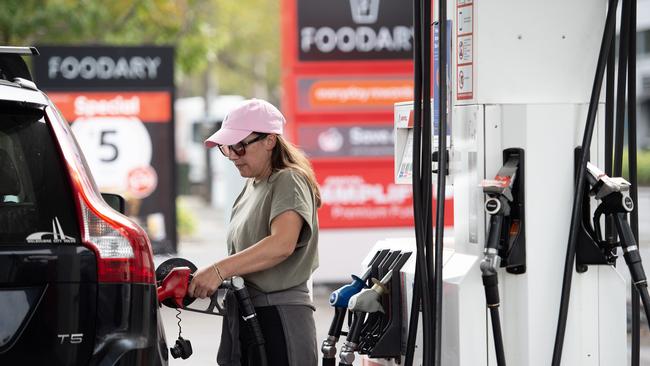Economists warn that Dutton’s petrol excise cut risks rekindling inflation
The Coalition’s proposal to slash costs at the bowser risks rekindling inflation, threatening to further delay interest rate relief.

The Coalition’s proposal to slash costs at the bowser risks rekindling inflation and delaying further interest rate cuts, just as price pressures have finally returned to the Reserve Bank’s target band, economists say.
Peter Dutton on Thursday pledged that a future Coalition government would temporarily halve the fuel excise – a tax collected on the production and importation of fuel – in the coming financial year, cutting the price of petrol by 25c per litre.
Economist Chris Richardson labelled the proposed excise cut as an “inflation disadvantage” that risked further delaying interest rate relief for borrowers by “a couple of months.”
“You’re giving out twice as much money as the first year of [Labor’s new] tax cuts and it arrives a year sooner,” Mr Richardson said. “It’ll make the RBA a little twitchy … There’s no free lunch with this.”
With the RBA still wary that price pressures are not fully contained, economists expect the central bank will reduce interest rates slowly. Bond traders, meanwhile, expect just two quarter percentage point rate cuts by year’s end, which would take the cash rate to 3.6 per cent.
Concerns regarding the inflationary impact of a cut to the fuel excise had previously been raised by opposition Treasury spokesman Angus Taylor, who in 2023 warned against the measure.
“While putting more money in people’s pockets through fuel excise might sound good, the problem is, it’s not actually solving the inflation problem and you’ll see price rises elsewhere as a result,” he told Sky News.
Fuel costs form a large part of the basket of goods and services measured by the Bureau of Statistics in its inflation gauge, meaning the proposed excise cut will have a similar effect to Labor’s temporary electricity rebates in lowering headline inflation.
But that reduction would result in a further divergence between the headline and underlying inflation rates, with the latter more accurately reflecting the strength of the price pressures in the economy.
After Labor announcing its opposition to the Coalition’s cost-of-living measure, the fight over the fuel excise dominated question time on Thursday, with the Opposition Leader challenging Labor to support the measure.
“Will the Prime Minister join with me in cutting the price of petrol and diesel to save tradies, pensioners and families up to $28 a week instead of his 70c a day tax cut which doesn’t even come in for 15 months?” he demanded.
Anthony Albanese in response ridiculed the Coalition’s plans, pointing to the Abbott government’s decision to reintroduce the annual indexation of the fuel excise in the 2014 budget and former prime minister Scott Morrison’s decision to similarly slash the levy.
“The Morrison leftovers have adopted the policy of the Morrison government,” the Prime Minister said, even though Labor had backed the measure in 2021.
At the time, Jim Chalmers said: “The reason why we support fuel excise relief is we want to see people under less pressure at the bowser. Nothing could make me happier than if there was some pressure taken off families who are doing it tough.”
With the temporary fuel excise cut set to cost the federal budget $6bn in forgone revenue, KPMG chief economist Brendan Rynne questioned whether the measure was an ideal use of taxpayer funds.
“Sure, we can afford it, but is it an optimal use of money? Probably not,” Dr Rynne said, also warning that petroleum companies might not pass through the savings in full, thus diminishing the benefit to motorists.
Former Treasury official Peter Downes, now of Outlook Economics, was more critical of the temporary cut, labelling it “bad policy”, but he said he believed the measure would prove popular among cash-strapped voters.
“Of course it’s going after the vote in the outer suburbs, but it seems like a policy thought up on the run, which is not a particularly good idea,” he said, warning that the measure would do nothing to stem the “fiasco” facing Australia’s excise duties.
Like alcohol and tobacco taxes, petrol excise receipts as a share of the total commonwealth tax take have fallen sharply in recent years as an increase in electric vehicle sales and the growing popularity of working from home has sliced revenues.
The fuel excise is estimated to account for just 3.9 per cent of overall federal tax collections this financial year, according to Tuesday’s federal budget papers.
After the High Court struck down a road user charge established by the Victorian government to levy electric vehicle drivers after finding the tax breached the Constitution, the states and territories have pressed the commonwealth to introduce a similar nationwide levy.
Those calls, however, have not been met thus far with neither Labor nor the Coalition announcing plans to establish a road user charge, despite mulling the change.



